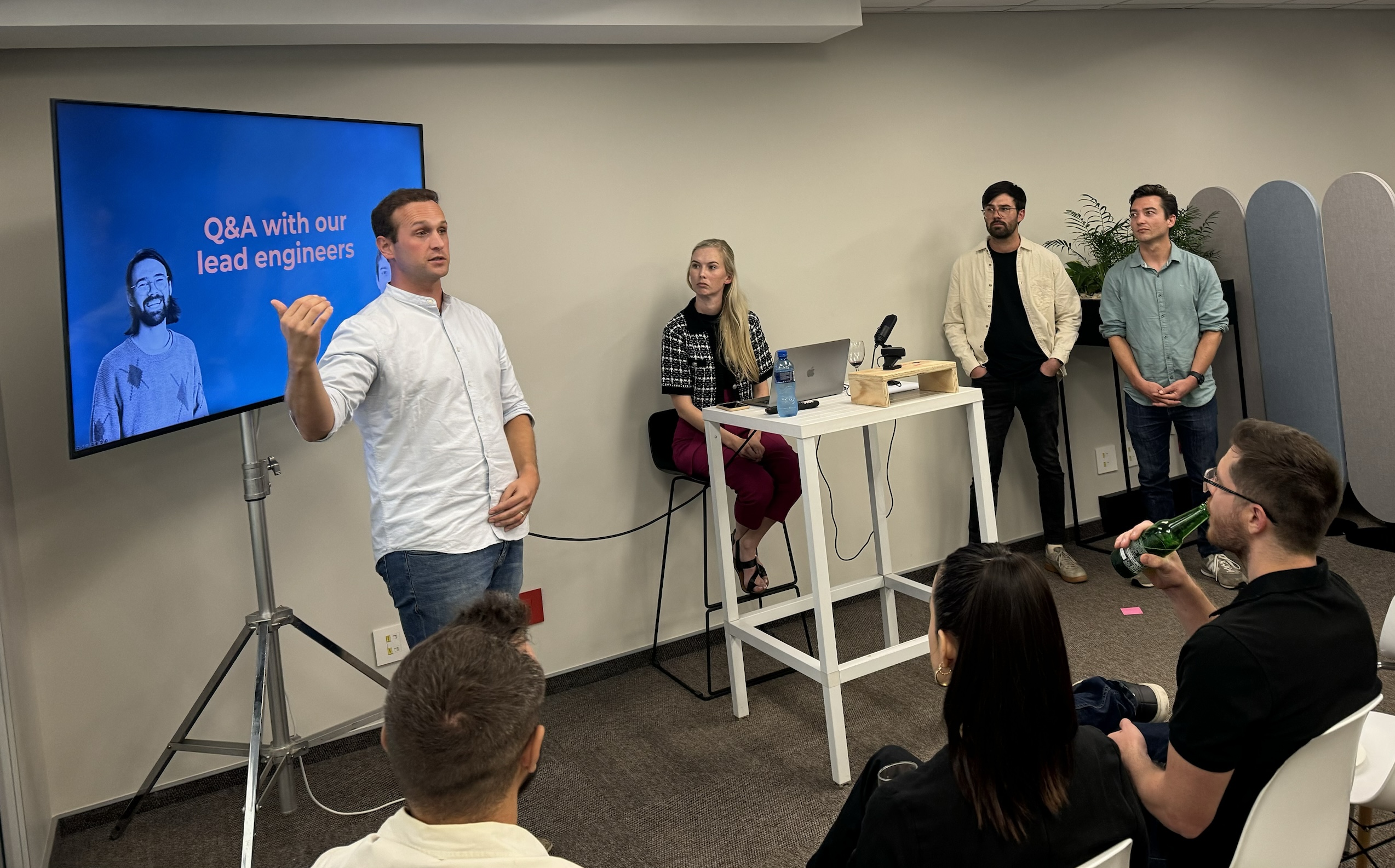In the bustling heart of Johannesburg, Gathr recently hosted a smashing product release event, inviting clients from prominent sectors like retail, telecoms, and technology to witness the unveiling of two groundbreaking features. Our team had the opportunity to chat with industry leaders and fintech enthusiasts, the excitement was definitely palpable. Our event took attendees on a journey through Gathr’s evolution, where our co-founders Michael Bowren and Christopher Ball, shed light on our new offerings and the technical marvels behind them.
How is Gathr shaking things up?
We’ve built scalable, flexible, and modular technology that enables every company to automate in a digital ecosystem. Our KYC and KYB solutions are designed for companies, with end consumers in mind, ensuring full compliance, while providing a great customer experience.
What exciting new features are set to transform affordability?
We set out to create these two new features to improve our affordability tool, allowing our clients to reach more customers and understand them better. Let’s take a closer look at these exciting additions we’ve recently launched.
Transaction Categorisation: Uncovering Financial Insights
Transaction categorisation stands as a cornerstone in Gathr’s commitment to delivering comprehensive affordability tools. At its essence, this feature offers a multifaceted view into customers’ financial behaviours, providing insights that transcend traditional assessments based solely on gross income and total expenditure.
The significance of transaction categorisation lies in its ability to dissect spending patterns with unparalleled granularity. By classifying each transaction into one of 36 distinct categories, ranging from essentials like utilities and groceries to discretionary spending like entertainment and gambling, Gathr equips its clients with a holistic understanding of their customers’ financial lives.
One of the primary advantages of transaction categorisation is its capacity to uncover subtle financial nuances that may elude conventional analyses. For instance, distinguishing between regular investments and impulsive expenditures like gambling can paint a vivid picture of a customer’s financial prudence or distress. By leveraging these insights, our clients can make informed decisions regarding loan or credit approvals, mitigating risks and fostering responsible lending practices.
Behind the scenes, the development of transaction categorisation posed a series of technical challenges, each requiring innovative solutions. Stephan Schoeman, our lead engineer, used our event as a chance to elaborate on the meticulous process of model selection, feature extraction, and data classification. The quest for accuracy, processing speed, and scalability led to the adoption of advanced learning models and continuous feedback loops, ensuring a robust system poised for future evolution.

Looking ahead, the future of transaction categorisation holds promise for even greater advancements. With smarter models and finer classifications on the horizon, our Gathr engineers envision a landscape where financial insights are not just comprehensive but deeply personalised. Multi-label classifications and holistic customer profiling offer glimpses into a future where affordability assessments are as nuanced as the individuals they serve.
In essence, transaction categorisation isn’t just a feature; it’s a gateway to a new era of financial intelligence. By illuminating spending patterns and uncovering hidden insights, Gathr empowers its clients to navigate the complexities of modern finance with confidence and clarity.
Scanned Statement Processing: Opening Doors to Inclusion
Scanned statement processing represents a paradigm shift in Gathr’s quest for financial inclusion. With over 30% of bank statements coming through our platform being uploaded in scanned format, and only 10% of South Africans having access to a laptop or computer to access internet banking, this feature addresses a critical need to accommodate diverse document types and extend accessibility to a broader spectrum of individuals.
At its core, scanned statement processing leverages OCR (Optical Character Recognition) technology to extract vital data from scanned bank statements. David Beretta, our lead engineer on the projected, explained the intricacies of this process, from initial document validation to AI-powered pre-processing and text extraction. Despite challenges of accuracy and variability inherent in OCR, Gathr’s engineering team has implemented numerous checks and redundancies to ensure seamless data extraction.

The decision to initially focus on Capitec statements was a strategic one, driven by their prevalence among South African consumers. By streamlining the processing of Capitec statements, Gathr aims to bridge gaps in accessibility and empower individuals from all walks of life to access financial tools and services.
Looking forward, the roadmap for scanned statement processing extends beyond Capitec to encompass major financial institutions like FNB, Nedbank, and Standard Bank. Through continuous innovation and technological advancements, Gathr envisions a future where OCR technology is not just faster and more accurate but also more adaptable to diverse document formats.
The implications of scanned statement processing extend far beyond technical innovation. By accommodating scanned documents, Gathr is not just improving its services; it’s breaking down barriers and fostering financial inclusion on a grand scale. From individuals in lower LSMs with limited access to online banking to agents facilitating document uploads, this feature ensures that no one is left out.
What’s next for us?
As we chart our course forward, the possibilities are limitless. With transaction categorisation, we foresee smarter models, finer classifications, and enriched user experiences. Multi-label classifications and holistic customer profiling beckon on the horizon, promising deeper insights and personalised services.
Similarly, in the realm of scanned statement processing, the future holds rapid advancements in OCR technology and broader support across financial institutions. Our roadmap includes extending support to major banks, ensuring comprehensive coverage and unwavering accessibility.
